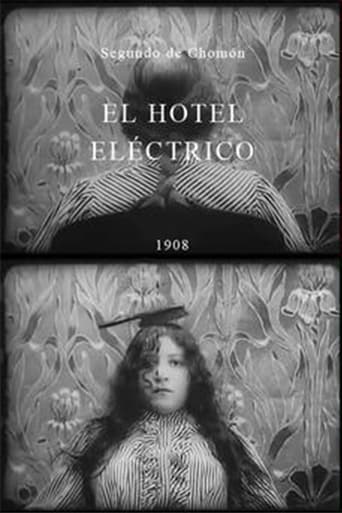He_who_lurks
Segundo de Chomon isn't a very popular directer when it comes to discussing films. The main reason he began working for Pathe was to copy the ideas of the French filmmaker Georges Melies, who was better known for due to the magnificent illusions he presented on screen. However what's good about seeing Chomon's work is that nearly all of the prints that survive of his films are beautifully hand-colored (this film isn't). Also, here Chomon makes use of stop-motion animation, a technique I haven't really seen Melies do (and something I don't think he ever really did at all).In this film, a couple stops in at a hotel where everything moves like magic, due to electricity. However, their little stay is interrupted when the man at the controls decides to play a trick on them, and as a result the whole room goes crazy, as furniture moves around uncontrollably. This adds a comic ending to the short. A nice one, but as one of the other reviewers said, it can be a little dull at times considering the film's story is mainly supportive of the effects we see. Some sequences go on too long. However, in the end it does remain a pretty fun film even by today's standards.
MartinHafer
"The Electric Hotel" is a very whimsical film--one that manages to make you smile over a hundred years later. This is a very unusual production, however, for director Segundo de Chomón as he himself stars in the film. He also appears with his wife, Julienne Mathieu--though she appeared in lots of his films without him."The Electric Hotel" is a completely silly film--and it intends to be. A couple arrive at a very modern hotel--so modern that the clothes put themselves away! In addition, by pushing buttons, the room will clean your shoes (this bit went on a bit too long), give you a makeover and even write a letter home telling everyone how much you are enjoying your vacation! All of this is achieved through stop-motion cinematography. While this is a relatively primitive technique and been done successfully for several years by the time this film came out, it is done very well and makes for some convincing effects. Overall, I'd rate this as one of Chomón's best--and still highly enjoyable today.
JoeytheBrit
What is today quite a common - in fact, outdated - special effect, at first surprises the viewer in such an old film but quickly becomes a little boring because too much time is spent on each individual trick. The special effect in question is the use of stop-motion photography to bring life to inanimate objects. We see a rather odd couple book into a high-tech hotel and, as their room is prepared, their baggage makes its own way upstairs and unpacks itself. Then the couple make themselves at home in the room. The man has his shoes polished by brushes and his whiskers trimmed by a razor that appears to float around in midair while the woman has her hair brushed and plaited. At the end of the film - perhaps reflecting a fear of new technology - everything goes haywire and the furniture begins spinning around the room. Like a kid with a new toy, director Segundo de chomon, spends too long at play
tavm
Just saw on YouTube what must have been one of the earliest uses of stop motion animation in history. In summation, as baggage is checked in that baggage moves by itself to a room where it opens itself revealing lots of brushes that now move out. We next see a man and a woman sitting down before we see the man's boot get unbuckled by itself. With the boot off, a brush moves itself up and down on the front end. We next see the woman's coat come off by itself before her hair gets a thorough brushing-also by itself-before the hair ties itself into a bun. Then comes a scene of a man in front of a wall full of electrical switches. As he pulls one large switch down, we cut to a scene of various chairs and other furniture moving in chaotic ways as the short ends...Primitive but still fascinating look at trick photography in the early 20th century. Must have truly awed audiences back then. Definitely worth a look for silent film buffs.


